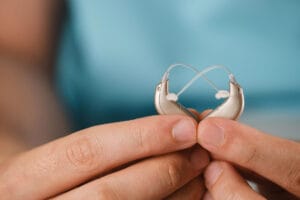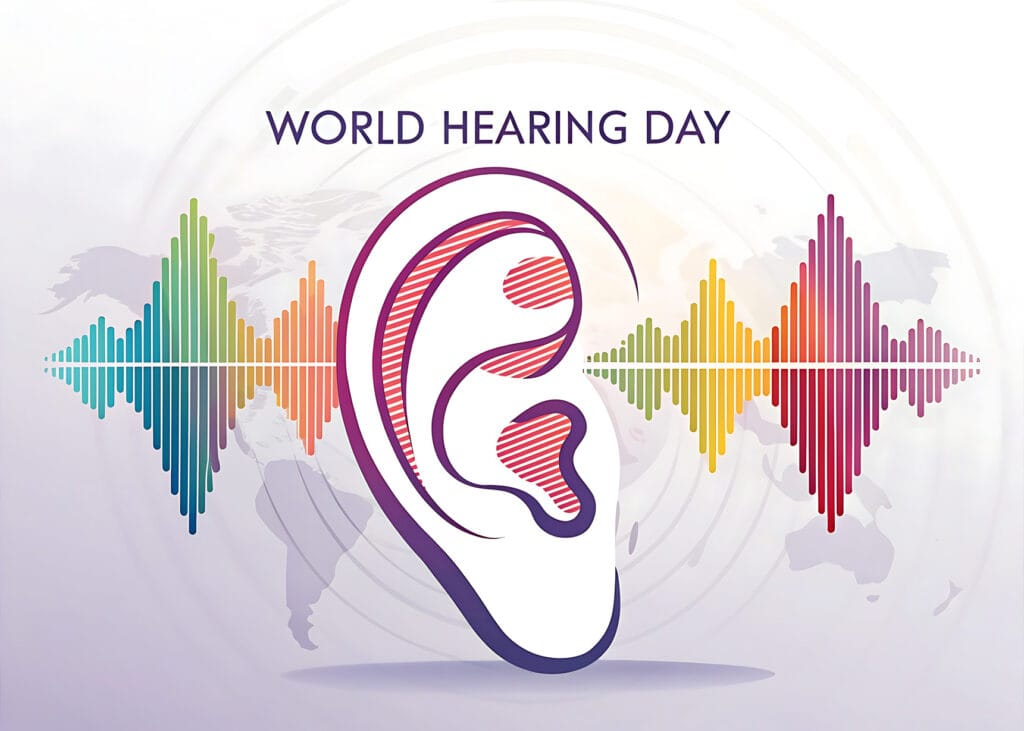Every year on March 3rd, the World Health Organization (WHO) observes World Hearing Day 2025 to raise awareness about hearing health. This year’s theme, “Changing Mindsets: Empower Yourself to Make Ear and Hearing Care a Reality for All!”, highlights the need to shift perceptions about hearing loss and take proactive steps toward better ear health.
At Hear4U, we believe that everyone deserves access to expert hearing care. From breaking outdated stigmas to making hearing solutions accessible, our goal is to ensure no one is left behind due to hearing impairments. In this blog, we will cover:
The Importance of Prioritising Hearing Health

The Role of Hearing in Everyday Life
Hearing is more than just a sense—it connects us to the world. It plays a crucial role in communication, cognitive function, and emotional well-being. Yet, approximately 1.5 billion people worldwide experience some degree of hearing loss. Therefore, early detection and intervention can prevent further deterioration. However, many individuals hesitate to seek help due to stigma, financial barriers, or lack of awareness.
The Impact of Hearing Loss on Daily Life
Hearing loss affects more than just your ability to hear sounds—it has broader implications for overall well-being. Consequently, World Hearing Day 2025 focuses on spreading awareness to encourage early intervention and hearing care solutions.
Consequences of Untreated Hearing Loss
Ignoring hearing health can lead to serious issues. Moreover, research shows that these problems worsen over time. Some key consequences include:
- Cognitive Decline – Untreated hearing loss increases the risk of dementia and memory issues. Moreover, studies have shown that hearing loss can accelerate brain aging.
- Social Isolation – Difficulty hearing conversations can lead to avoiding social interactions and loneliness.
- Reduced Workplace Productivity – Hearing difficulties can affect communication, career growth, and efficiency at work.
- Emotional Stress – Struggling to hear loved ones can cause frustration, anxiety, and depression.
Taking early action on World Hearing Day 2025 can improve overall quality of life and maintain independence.
Overcoming Barriers: Myths vs. Reality
Common Misconceptions About Hearing Loss
Despite the advances in technology and increased access to hearing care, many people delay hearing treatment due to common myths. Consequently, let’s clear up some misconceptions and encourage better hearing care this World Hearing Day 2025.
Myth: “Hearing loss is a natural part of ageing, and nothing can be done.”
Reality: While hearing may change over time, early detection and intervention can slow progression and significantly improve hearing quality. Modern hearing aids and assistive.
Myth: “Only elderly people need hearing aids.”
Reality: However, this is not true. Hearing loss can affect people of all ages, from young adults to seniors. For instance, exposure to loud noises, infections, and genetics can all contribute to hearing issues at any stage of life. Therefore, early intervention is the key to maintaining long-term hearing health.
Myth: “Hearing aids are too expensive, and insurance doesn’t cover them.”
Reality: At Hear4U we offer affordable options and even free hearing tests to make hearing care more accessible. We also offer Hearing Aid Insurance, in partnership with Assetsure.
Myth: “Ear cleaning with cotton swabs helps prevent hearing problems.”
Reality: Cotton swabs can push earwax deeper, causing blockages or even damaging the eardrum. Hence, professional earwax removal is safer.
Myth: “Hearing loss isn’t big deal – it only affects my ears.”
Reality: Untreated hearing loss is linked to cognitive decline, memory loss, anxiety and depression. Therefore, taking early action helps protect brain function and overall well-being.
Myth: “Ringing in my ears (tinnitus) is normal and will go away on its own.”
Reality: Occasional ringing may be normal, but persistent tinnitus can be a sign of hearing damage or underlying condition. Hearing aids and therapy can help manage it.
Overcome Barriers: Challenges & Solutions
Understanding the Real Challenges in Hearing Care
For many of you, the barriers to seeking hearing care go beyond myths—financial concerns, outdated perceptions of hearing aids, and lack of awareness create unnecessary hurdles. As a result, many people avoid seeking treatment. Let’s explore those barriers and how they can be overcome:
Barrier: “Hearing tests and hearing aids are too expensive.”
Solution: We at Hear4U offer free hearing assessments, flexible financing options, and affordable hearing solutions including Hearing Aid Insurance in partnership with Assetsure to ensure cost is not a barrier to ear care.
Barrier: “Hearing aids are bulky and uncomfortable.”
Solution: In today’s time these hearing aids are sleek, lightweight and technologically advanced, offering Bluetooth connectivity, noise reduction and rechargeable batteries for a seamless experience.
Barrier: “I can manage without hearing aids.”
Solution: Ignoring hearing loss can make daily communication challenging and impact mental as well as emotional health. Using the right hearing aids or assertive devices can improve conversations, relationships and overall well-being.

How Hear4U is Making a Difference?
At Hear4U, we provide expert hearing care services, including:
Free Hearing Consultations to assess hearing loss early.
Professional Earwax Removal for better ear health.
Custom Hearing Aid Fittings using the latest technology.
Tinnitus Counselling & Therapy for managing persistent ringing.
Protective Hearing Solutions to prevent hearing damage.
Our expert audiologists offer personalised care to help you make the right decisions about your hearing health.
Take Charge of Your Hearing Health Today
World Hearing Day 2025 is not just about awareness—it’s about action! Here’s what you can do today:
Book a Hearing Test – Even if you currently experience no symptoms, regular check-ups can still detect issues early. In fact, early intervention ensures better long-term hearing health.
Protect Your Ears – Reduce exposure to loud noise, wear ear protection, and maintain safe listening levels.
Break the Stigma – Encourage open conversations about hearing loss and promote accessibility.

Shaping a Future Where Hearing Care is for All
Looking ahead, this World Hearing Day 2025 is the perfect opportunity to commit to changing mindsets about hearing health. By taking proactive steps, such as raising awareness, removing barriers, and making hearing care accessible, we can ensure a future where everyone has the opportunity to hear clearly and live fully.
At Hear4U, we are here to support you on your hearing health journey. Take the first step towards better hearing today!
FAQ
How do I know if I have hearing loss?
Hearing loss often develops gradually, making it hard to notice. Common signs include:
- Difficulty following conversations, especially in noisy environments.
- Frequently asking others to repeat themselves.
- Increasing the volume on the TV or phone is higher than usual.
- Struggling to hear high-pitched sounds, like doorbells or alarms.
- If you experience any of these symptoms, a hearing test can assess your hearing health. Book a free hearing test with Hear4U today.
At what age should I get my hearing tested?
Hearing tests aren’t just for the elderly. Adults should have a hearing check every 2-3 years, while those exposed to loud noises (e.g., musicians, factory workers) should have an annual test. If you notice changes in your hearing, don’t wait – early detection prevents further deterioration.
What causes hearing loss?
Hearing loss can result from various factors, including:
- Age-related hearing decline (presbycusis)
- Prolonged exposure to loud noises (workplace concerts, headphones)
- Ear infection or untreated medical conditions
- Genetics (family history of hearing loss)
- Excessive earwax build-up, leading to temporary hearing issues.
- A professional hearing assessment can determine the cause and the best treatment.
Can I prevent hearing loss?
While some types of hearing loss are unavoidable, you can protect your hearing by:
- Avoiding prolonged exposure to loud noise
- Using ear protection in noisy environments
- Keeping the volume at safe levels when using headphones or speakers
- Having regular hearing check-ups to detect and address issues early.
What happens if hearing loss is left untreated?
Untreated hearing loss can lead to:
- Cognitive decline and dementia risk.
- Social isolation and communication difficulties.
- Emotional distress, including anxiety and depression.
- Reduced workplace performance and career limitations.
- Seeking help early improves overall well-being and quality of life.
Can I clean my ears with cotton swabs?
No, cotton swabs can push earwax deeper, leading to blockages or even eardrum damage. The safest way to remove excess earwax is through professional earwax removal, available at Hear4U.






